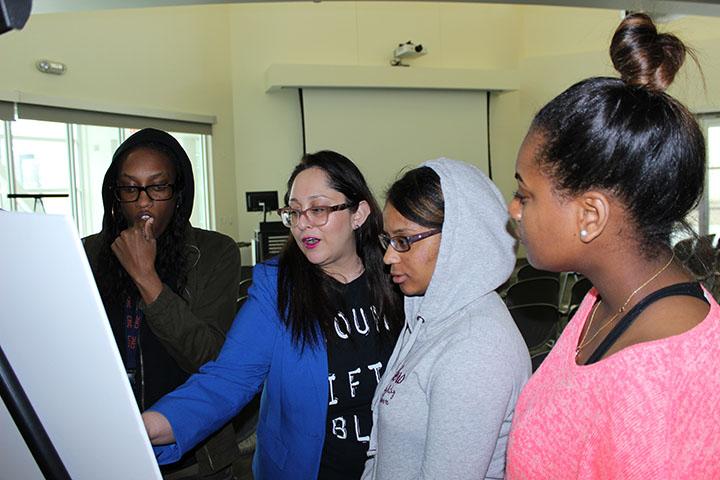Unequal opportunity for black students discussed at Black History Month event
An interactive talk kicked off Black History Month at Cosumnes River College. Raquel Simental, director of external relations and communications for Education Trust West, hosted the first of two ‘Black Minds Matter and Data Equity Walk’ events on Feb. 15.
There was a short introduction where Simental explained the statistics that were printed on easel boards around the room. These covered various areas of concern for California black students through grade school and into college.
As part of the ‘Data Equity Walk’ portion of the event, participants were provided sticky notes and encouraged to write their first reactions to the data and post them on the boards, as well as discuss the data amongst one another. Simental then hosted a wrap-up discussion, in which participants asked specific questions about the data, had a guided analysis of a problem they observed or shared their general feelings about the information they just received.
“This information is important to know because we don’t talk about the gaps in opportunity and the gaps in achievement of our students of color, our low income students, our English learners,” Simental said. “This data doesn’t get talked about. We talk about how schools are doing, overall, but we don’t talk about how subgroups are doing.”
Imari Trimble, 21, a film and media studies major, said she was moved by the data and felt concerned that not enough students were getting this information.
“It’s scares me because there’s all this information and people are missing out on it,” Trimble said. “I feel like people missed out on something that could have got them thinking. You see people and you’re almost like, ‘I wish you were in here to hear this and take in this information, knowledge and experience.’”
Simental said that the goal of the Data Equity Walk program is to make long, jargon-filled data more accessible to the community by breaking it down and presenting the simple facts about complicated issues. She urged people to stay connected with their educational centers and contact them for information that can be relevant to understanding the needs of students of color, low income students and English-learning students, and use it as a launching point for bringing their concerns to the attention of various education boards.
Counselor Teresa Aldredge, a coordinator of the event, said that she hoped this event exposed students to the thought of advocacy and how they can make a difference in both their lives and the lives of those who were represented in the data.
“College is an educational opportunity for students to learn more, and whenever you expose them to things that they’re not getting in the classroom, that in itself is going to broaden their learning,” Aldredge said. “And I’m sure they’re not seeing this data anywhere else.”
The national theme of Black History Month for 2017 is the crisis in black education, so Aldredge said that she thought it was fitting to expose students to statistics that follow the theme. Trimble said that seeing the numbers put things into a different perspective.
“When you look at those data and statistics, it’s like ‘I am on that,’” she said. “I’m a part of that, in a way. So I wish I wasn’t part of such a small group. I wish there was a bigger group.”

